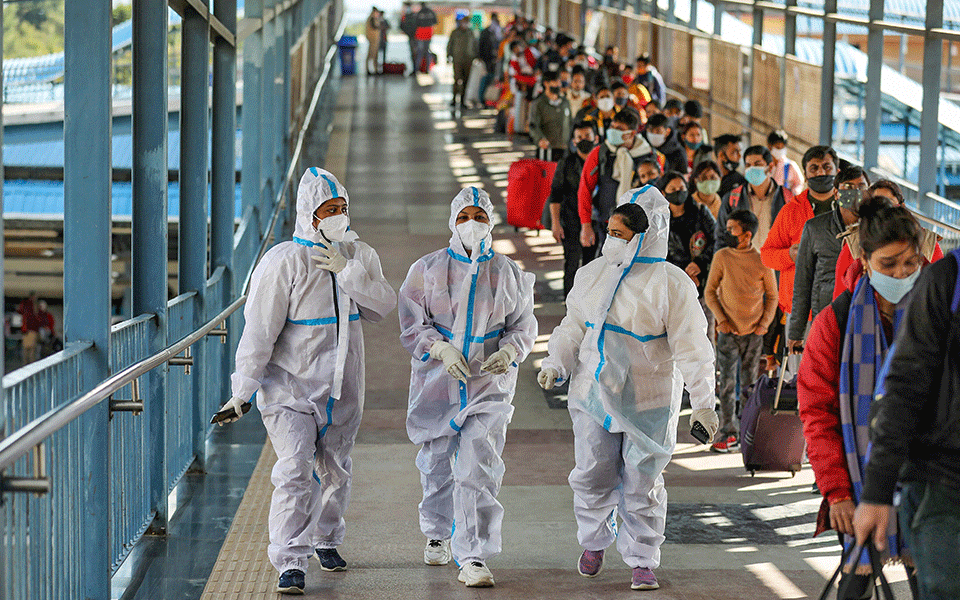Los Angeles (PTI): Vaccinated adults have a lower risk of severe illness due to Omicron variant of coronavirus, and are less likely to land in intensive care compared with unvaccinated patients, a US study suggests.
The study, published in a weekly report by the US Centers for Disease Control and Prevention (CDC), also found that during the Omicron period fewer patients died while hospitalised, compared with those admitted when the Delta variant was dominant.
"Overall, the Omicron-period group had a lower likelihood of being admitted to the intensive care unit (ICU) and were also less likely to require invasive mechanical ventilation compared with the Delta-period group," said Matthew Modes, a pulmonologist at Cedars-Sinai Medical Centre in the US, and co-first author of the study.
The researchers looked at the characteristics of 339 patients hospitalised with COVID-19 at Cedars-Sinai Medical Center from July to September of 2021, when the Delta variant of SARS-CoV-2 was dominant.
They compared that group with 737 patients admitted with COVID-19 during December 2021-January 2022, when the Omicron variant was most prevalent.
Clinical information was gathered from the electronic health records of the patients in the study.
The analysis shows that a greater portion of the patients hospitalised during Omicron were vaccinated as compared to patients hospitalised during the summer of 2021 when the Delta variant predominated.
"In addition to the protection that vaccination offered people admitted to the hospital when Omicron dominated, we saw that the addition of a booster dose appeared to be particularly important in reducing the severity of illness, especially among older adults," said senior author of the study Peter Chen, from Cedars-Sinai.
"Unvaccinated patients hospitalised with COVID-19 during the Omicron variant dominance still had a higher chance of being admitted with serious complications and appeared to be at higher risk for the development of respiratory failure, compared with vaccinated patients," said Chen.
The researchers noted that vaccination, including a booster dose for those who are fully vaccinated, remains critical for mitigating the risk of severe illness associated with SARS-CoV-2 infection.
"A clear pattern emerges if you take just the Omicron-period patients and compare their vaccination status against the percentage of them who ended up in the ICU," said Michael Melgar, a co-first author of the study and a medical officer with the CDC.
"The more vaccinated someone is -- from unvaccinated, partially vaccinated, fully vaccinated without a booster dose to fully vaccinated with a booster dose -- the better the outcome for the patient," Melgar added.
Let the Truth be known. If you read VB and like VB, please be a VB Supporter and Help us deliver the Truth to one and all.
Ottawa (PTI): Three Indian nationals have been arrested by Canadian police on an anti-extortion patrol and charged after bullets were fired at a home.
Harjot Singh (21), Taranveer Singh (19) and Dayajeet Singh Billing (21) face one count each of discharging a firearm, and all have been remanded in custody until Thursday, the Surrey Police Service (SPS) said in a statement on Monday.
The suspects were arrested by patrol officers after an early morning report of shots fired and a small fire outside a home in Surrey's Crescent Beach neighbourhood, the LakelandToday reported.
On February 1, 2026, the SPS members were patrolling in Surrey’s Crescent Beach neighbourhood when reports came in of shots being fired and a small fire outside a residence near Crescent Road and 132 Street.
The three accused were arrested by SPS officers a short time later, the statement said.
SPS’s Major Crime Section took over the investigation, and the three men have now been charged with Criminal Code offences, it said.
All three have been charged with one count each of discharging a firearm into a place contrary to section 244.2(1)(a) of the Criminal Code.
The investigation is ongoing, and additional charges may be forthcoming. All three have been remanded in custody until February 5, 2026.
The SPS has confirmed they are all foreign nationals and has engaged the Canada Border Services Agency, it said.
One of the suspects suffered injuries, including two black eyes, the media report said.
Surrey police Staff Sgt. Lindsey Houghton said on Monday that the suspect had refused to comply with instructions to get out of the ride-share vehicle and started to "actively resist."
"As we were trained, he was taken to the ground and safely handcuffed," said Houghton.
A second suspect with a black eye was also injured in the arrest after refusing to comply, Houghton said.
The arresting officers were part of Project Assurance, an initiative that patrols neighbourhoods that have been targeted by extortion violence.
Houghton said the Canada Border Services Agency (CBSA) is also involved because the men are foreign nationals, and the trio may face additional charges.
It's not clear if the men are in the country on tourist visas, a study permit, or a work permit, but Houghton said CBSA has started its own investigation into the men's status.
Surrey has seen a number of shootings at homes and businesses over the last several months, but there's been an escalation since the new year.





